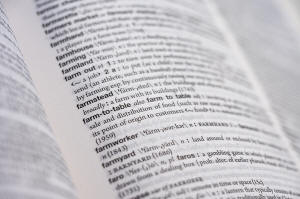Hard pass. Cold brew. Dad bod. Merriam-Webster adds over 5,000 words to
'Collegiate' dictionary
[September 25, 2025]
By LEANNE ITALIE
NEW YORK (AP) — Word nerd alert: Merriam-Webster announced Thursday it
has taken the rare step of fully revising and reimagining one of its
most popular dictionaries with a fresh edition that adds over 5,000 new
words, including “petrichor,” “teraflop,” “dumbphone” and “ghost
kitchen.”
The 12th edition of “Merriam-Webster's Collegiate Dictionary” comes 22
years after the book's last hard-copy update and amid declining U.S.
sales for analog dictionaries overall, according to Circana BookScan. It
will be released Nov. 18, with preorders now available.
Petrichor, by the way, is a pleasant odor after a rainfall following a
warm, dry period. Teraflop is a unit of measure for calculating the
speed of a computer. Dumbphones are just that, mobile devices we used
before the smartphone revolution. And ghost kitchens, which came into
their own during the pandemic, are commercial spaces for hire.
Other additions: “cold brew,” “farm-to-table,” “rizz,” “dad bod,” “hard
pass,” “adulting” and “cancel culture.” There's also “beast mode,” “dashcam,”
“doomscroll,”“WFH” and “side-eye.”
The new “Collegiate” also includes enhanced entries for some top
lookups, and more than 20,000 new usage examples. All of the added words
were already available on Merriam-Webster.com.
How did they make room for all that?
The company removed two sections of the “Collegiate's” 11th edition that
had sparse biographical and geographical entries to make room for the
new content. Greg Barlow, Merriam-Webster's president, exclusively told
The Associated Press ahead of the announcement that people no longer use
dictionaries to learn such things as the location of Kalamazoo or who
Nikolai Rimsky-Korsakov was. For that, they reach for the internet.

(It’s a city in southwest Michigan, for the eternally curious, and he's
a Russian composer who died in 1908.)
Merriam-Webster also eliminated some obscure and antiquated words,
including “enwheel,” meaning encircle.
“We wanted to make the ‘Collegiate’ more useful, a better design, more
interesting,” Barlow said. “We wanted it to be more rewarding to browse,
more fun to look through, and to really be practical for research, but
also a beautiful book.”
What's happening with dictionary sales in general?
The chunky, linen-cover “Collegiate” update weighs in at nearly 5
pounds. It comes as adult reference book sales, including dictionaries
and atlases, have shown annual declines since 2022, according to Circana
BookScan, which captures 85% of the print market. In the 12-month period
ending Sept., 6, dictionary sales fell 9% compared with the same period
prior.
Merriam-Webster, the country's leading dictionary company, sells about
1.5 million of them a year. Most are regularly revised but not fully
overhauled like the “Collegiate,” Barlow said. The company's retail
sales overall have generally held steady in the last few years, he said.
Print sales account for a small fraction of the company’s revenue.
“While the print dictionary is not at all important to the growth and
profitability of this wonderful language company, it’s still our heart,”
Barlow said. “There are people out there who just love books, and we
love books.”
For dictionary sales overall, there's a bit of sunshine at Barnes &
Noble. The chain's dictionary sales have gone up so far this year over
the same period in 2024, said Kat Sarfas, marketing manager for
nonfiction. She noted similar increases for such reference materials as
the U.S. Constitution as well.
“I do think there is that nostalgia that people have to be able to pull
a dictionary off the shelf and look up a word,” Sarfas said. “There's a
certain desire to have these kinds of reference materials at home. It
may be something that people feel like, as educated people, we should
own.”
[to top of second column]
|

This image released by Merriam-Webster shows a page from the 12th
edition of the "Collegiate Dictionary." (Merriam-Webster via AP)

Dictionaries may be down but they aren't dead yet
While Merriam-Webster's “Collegiate,” originally focused on the needs of
college students, is among top sellers in dictionaries for Barnes &
Noble, its general-interest “The Merriam-Webster Dictionary” is more
popular. It was last tweaked in 2022. A pocket version is also a strong
seller, Sarfas said.
Death knells for print dictionaries have been ringing since the rise of
the internet, said Grant Barrett, a lexicographer, former dictionary
editor for Merriam-Webster and others, and co-host of public radio's “A
Way with Words.”
“Now we're in this weird limbo where people want the dictionary but they
don’t want to pay for it, because they’re used to getting things for
free on the internet,” he said.
Merriam-Webster's website receives about a billion visits a year, making
the company a word digital leader as well, Barlow said. Over the last 10
years, revenue overall has grown by nearly 500% on the strength of its
online dictionary, thesaurus, mobile apps and word games.
The new “Collegiate” introduces curated word lists, such as words from
the 1990s. And it has more word histories. Did you know “calculate”
comes from the Latin for “pebble,” because ancient Romans used little
stones to do addition and subtraction?
And, for incredibly granular dictionary fans, the new “Collegiate”
preserves lettered thumb notches — those little finger-size dents along
the edges of reference book pages — to make browsing easier. The only
printer doing the notches in the U.S. has closed since Merriam-Webster
was last in need, so it had to go to India, Barlow said.
Why do print dictionaries still matter?
Print versions still matter in preserving cultures, as gifts, as a
household utility, and for students under cellphone bans at school,
among other reasons, said Sarfas, Barrett and other book pros.
“There are lots of communities that speak languages that have never been
documented, and they may not have been documented because those
languages might have been actively suppressed. I’m thinking about
Indigenous communities across North America,” said Lindsay Rose Russell,
executive director of the Dictionary Society of North America.
“Having a print dictionary has all along sort of indicated the
legitimacy of a language,” said Russell, also an author who teaches
English at the University of Illinois at Urbana-Champaign.

Barrett said his show and its companion podcast receive a lot of letters
from readers that lend insight into how they use dictionaries.
“Some people use the dictionary almost as a meditative resource where
they just open it up and see what they find and kind of let their minds
wander a little bit,” he said.
Got a band in need of a name? Commodores' trumpet player William King
used a dictionary to find his, running his finger down a page, Russell
noted.
“We lucked out,” King told People magazine in 1978. “We almost became
‘The Commodes.’ ”
All contents © copyright 2025 Associated Press. All rights reserved |